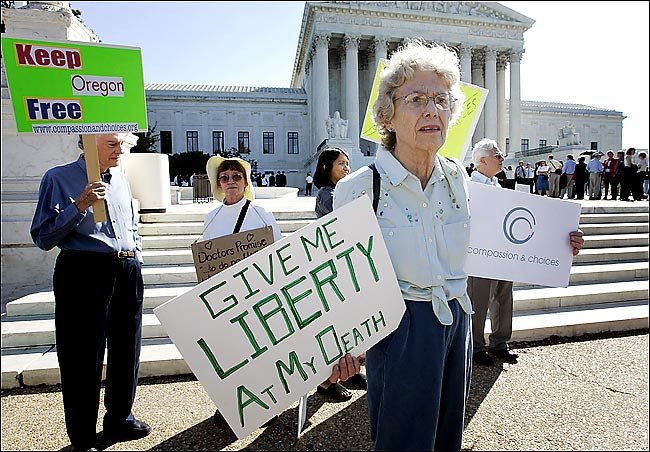
Death with Dignity Laws grant an end-of-life wish to terminate one’s life early. Because of these laws, it is legal to self-administer medication that speeds up the dying process. In order to be eligible you need to meet all of the following:
- resident of a state that has such laws (California, Colorado, District of Columbia, Hawaii, Maine, New Jersey, Oregon, Vermont, or Washington)
- 18 years of age or older
- mentally competent
- diagnosed with a terminal illness that will cause the patient’s death within six months.
If one feels they meet all the relevant criteria and wishes to terminate their life earlier than foretold, the first step is to speak with their primary care physician about this option to confirm eligibility. After that, the physician will get a second opinion and will prescribe the appropriate medication. It is up to the patient at that point to pick up the medication and take it, but not all wishes come true. For example, an Oregon study in 2000 revealed that 16% of the requests for aid-in-dying were granted by physicians, but only 10% requests actually resulted in the patient taking the medication which is a small number of patients.
Recent research has focused largely on the physician’s conscience in administering this kind of medication to a patient. James F. Childress is cited as defining “conscience” in the following way: “Conscience can be understood as a mode of thought in which individuals consider how actions accord or conflict with core moral principles and values, and a commitment to act in accordance with such moral judgments” The problem is that a physician’s “moral principles” may speak against administering this medicine, so it seems unethical for them to administer it — much less be forced to administer it. Because of this, the physician’s conscience is clear. However, what about the patient’s conscience? Doesn’t the patient also have a struggle in keeping a clear conscience when considering taking this kind of medication? Just because it is the patient’s wish, doesn’t mean the decision is not heavy.
For seniors considering this end-of-life option, keeping a clear conscience means evaluating what basic moral principles you hold to. If there is a conflict between the morals you keep and taking the medication, then keeping a clear conscience may not be possible. In that case, if you still find that your wish to be pain free is overwhelming, one can abandon those moral principles or seek to reconcile their views with taking this medication. However, for those that have no conflict, and find that being pain free is reason enough to take this medication without compromising the morals they keep, then keeping a clear conscience is possible. The challenge there becomes following through: is being pain free enough of a reason for you to take this medication?
At the end of the day, the choice belongs to the seniors. It is up to them to decide if taking this kind of medication is worth it for them. Supporting them in these decisions means listening to them, referring them to an appropriate physician, staying informed with these laws in one’s respective state, and acquiring the necessary documents for the senior. This lessens the weight of their decision and helps keep their conscience clear at every step in the process. Only then can their end-of-life wish be granted with dignity.
WellPath Partners is your senior resource referral guide. Follow us on ALL social media platforms and join us weekly for more content and public health discussions.
By: Jonathan Reza
Office Support Specialist at WellPath Partners
B.S. in Philosophy at University of Redlands
M.A. candidate in Philosophy at California State University, Long Beach
